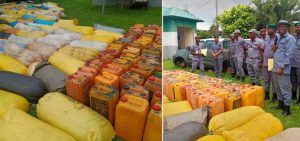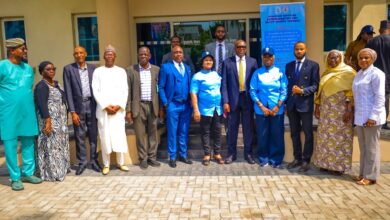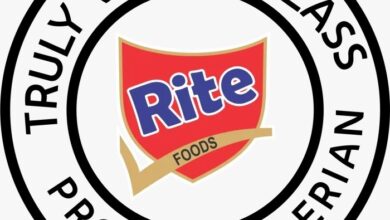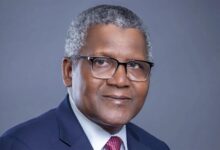
Comptroller General of Customs, Bashir Adewale Adeniyi is reinvigorating NCS battle with smugglers of petroloeum products to safe guard Nigeria’s economy
In what appears to be halting the parasitic tendencies of neighbouring countries relying on Nigerian premium motor spirit, Nigeria’s Comptroller General of Customs, Bashir Adeniyi has reorganised the NCS strategy to prevent petroloeum product smugglers.
 According to the customs chief, the team will deploy a blend of intelligence and tact without necessarily setting up check points that similar bodies have been used to operating with.
According to the customs chief, the team will deploy a blend of intelligence and tact without necessarily setting up check points that similar bodies have been used to operating with.
Media reports estimate that 15.64 million litres of petrol were smuggled out of Nigeria daily as the petroleum products retail on average 3.7 times cheaper than those of her neighbours while daily petrol supply stands at 68 million litres.
 Recently, Comptroller-General of Customs, Adewale Adeniyi, inaugurated a workshop in Abuja at the Nigeria Customs Command and Staff College (NCCSC), for a newly formed tactical team, Operation Whirlwind, aimed at combating the smuggling of petroleum products to the neighbouring countries.
Recently, Comptroller-General of Customs, Adewale Adeniyi, inaugurated a workshop in Abuja at the Nigeria Customs Command and Staff College (NCCSC), for a newly formed tactical team, Operation Whirlwind, aimed at combating the smuggling of petroleum products to the neighbouring countries.
Adeniyi who harped on the crucial role the team would play in protecting the nation’s economy from the adverse effects of smuggling petroleum products, noted that economic saboteurs must be brought to justice.
 According to him : “Over the years, we have rebuilt the service to an enviable height, our revenue is increasing, and our targets have also increased. However, if we are not significantly impacting the Nigerian economy, then we must do better.”
According to him : “Over the years, we have rebuilt the service to an enviable height, our revenue is increasing, and our targets have also increased. However, if we are not significantly impacting the Nigerian economy, then we must do better.”
The workshop was designed to equip the Operation Whirlwind team with the skills and knowledge necessary to effectively curb smuggling, particularly of petroleum products diverted to neighbouring countries.
“This is not a task force or the setting up of checkpoints. This is an intelligence-driven operation that will support the political will at the highest level.
“Our dedication and loyalty must not be compromised. There will be serious consequences against whoever acts against this mission. There is zero tolerance for sabotage.
“You were selected because you can do the job. Your coordinator’s record is impeccable, and your assignment can’t succeed without you working as a team. You are to complement the existing structure. You are not going as competitors; you are going to fight people sabotaging our efforts.”
The inauguration of Operation Whirlwind marks a significant step in Nigeria’s fight against smuggling and economic sabotage.
As the team embarked on their mission, the Comptroller General of Customs asserted that the expectation is clear: to protect Nigeria’s economic interests with unwavering dedication and integrity.
Why Fuel Smuggling Thrive at Borders
Despite the widely reported removal of petroloeum subsidy by the President Bola Tinubu’s administration, premium motor spirit (PMS) Nigeria is grappling with the unending state of fuel smuggling across various land borders.
This is also happening with reports that the country is faced with another season of cross-border smuggling of Premium Motor Spirit (PMS) as the corruption-ridden fuel subsidy regime is already back, energy experts say.
This is more so because premium motor spirit and other crude oil byproducts are cheaper in Nigeria compared to other countries in the West African sub region.
For a liter of PMS sold in Nigeria at an average of N700 per liter, same quantity is sold at almost double of its naira equivalent in Benin Republic, Niger, Chad and Cameroon leaving the smugglers with much profits despite additional costs incurred for logistics
It is believed that the return of the subsidy and floating of the naira making neighbouring countries resort to Nigeria’s ‘cheap’ fuel, which could lead to inflation of Nigeria’s consumption figures by relevant authorities.
Tinubu-led administration had announced a ‘no more subsidy’ regime on May 29 – the day he took over power.The move consequently triggered over a 200 per cent increase in PMS being subsidised by the government prior to the declaration.
“Nigeria has missed the opportunity to reform the oil sector and learn from its counterparts like Petrobrass and Saudi Aramco, which are reaping the benefits of such reforms. It has also lost the goodwill of the Nigerian people with a poor approach to social intervention programmes,” Lead Director of the Centre for Social Justice, Eze Onyekpere said
Following the announcement of fuel subsidy removal by Tinubu, the Nigerian National Petroleum Company Limited (NNPCL) distorted the market with a regulatory “price control regime”, which saw licensed marketers unable to import amid a short supply of dollars at the official market rate.
Queues have refused to disappear across several filling stations in the country











